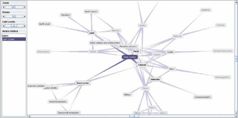Information integration may not be enough
Integrating information in academic libraries is very important but some users don't know how to find this information in the first place. Credo Reference is taking on the challenge of enticing users to their libraries' resources, writes John Dove

It is no secret that academic libraries are struggling with finding ways to bring the Google generation of students to discover the value of resources provided to them by their universities [1].
Recent research at the University of Washington into undergraduates at several diverse universities in the USA revealed that students today find course-related research more difficult than previous generations did. This was independent of how many online academic resources are being provided to them [2].
Over the past several years I’ve participated in workshops and talks with librarians in the UK and USA. A question I always pose to the audience is, ‘Where do students get stuck in their course-related research?’ The leading answer to that question is always some form of: ‘Newer students don’t have the vocabulary to pose a proper query to the professional databases we provide for them’.
Credo Reference has won a reputation for innovation in online reference, in particular for some of our exploration and discovery tools, and for our ability to pass users on to other resources of the library (such as academic databases and sets of online journals, as well as other online reference systems).
But no matter how well integrated an online reference system is within the library, it is not doing much for students’ greatest deficiency if it doesn’t solve the ‘findability’ problem.
For the last year and a half our product team (which is made up of both software developers and library science graduates) has been putting together the technologies and components that we think will start to address this problem.
One of the big advantages we can bring to the table is that the content of high-quality academic subject encyclopaedias from many of our partner publishers is exactly the kind of content a student new to a field could use. Subject encyclopaedias are built with the objective of providing someone new to a field with the overall context and vocabulary of the field. ‘Normalisation’ means something very different in psychology than it does in political science but a good subject encyclopaedia from either field will give someone new to the field a good grasp of the specific meaning it has in that field.

Putting content onto free web could help entice users into their libraries’ resources
We have among our partner publishers the three biggest academic publishers: Elsevier Science, WileyBlackwell, and Springer. We have a growing number of fine university presses such as Harvard, Chicago, Cambridge, and Edinburgh. And recently some of the specialty academic presses such as Edward Elgar and Willan Publishing have begun providing Credo with subject encyclopaedias.
Enticing students from the free web
We’ve now firmly set ourselves on a direction that we think will start to address the problem of enticing students from the free web into their libraries. There, they will find pages of content with both authoritative reference material on topics of interest to the inquiring student and content and links provided to them by librarians at their academic institution.
There are several elements to this direction. Each of these elements will be improved upon as we roll-out these capabilities – taking in feedback from users, librarians, and publishers.
The first of these elements is to put portions of our content directly out onto the free web. Credo Reference is in a significant percentage of universities in both North America and in the UK. By free web, we mean more than just allowing search-engine crawling. We mean social media sites such as Facebook and wherever else we detect that students are turning to for reference-like information.

John Dove
Secondly, the content we put out will be full-text – without speed bumps of any kind such as logins/signups, pay-per-view or snippets. Otherwise students will learn to avoid them and look elsewhere.
In addition, students exploring for better context of a term or phrase should be able to find such context wrapped up with links that are defined by their local librarian. These full-text topics should be built with hundreds of links to great online resources both inside and outside the library’s holdings.
This “wrapper”, which a librarian helps to define, will include links to professional databases, online journals and the library catalogue, as well as to librarian-recommended sites on the free web. Such wrappers will be customisable to general subject areas so that business students or humanities students, for example, will each be enticed by further sources appropriate to their interests.
The final element is to provide good statistics. These will inform librarians of how much traffic has come to them, from where, and where these users then go on to, especially if they go to other resources in the library.
I welcome feedback or suggestions from publishers, librarians, or anyone else interested in finding ways in which today’s students can more easily become aware of research in their chosen field of study.
John Dove is president of Credo Reference
[1] CIBER, University College London, Information behaviour of the researcher of the future: a CIBER briefing paper. January 2008 (www.bl.uk/news/pdf/googlegen.pdf). Study commissioned by the British Library and JISC
[2] Alison J. Head, Ph.D. and Michael B. Eisenberg, Ph.D., What today’s college students say about conducting research in the digital age, Project Information Literacy Progress Report, Research sponsored by a gift from Proquest, 4 February 2009, The Information School, University of Washington. (projectinfolit.org/pdfs/PIL_ProgressReport_2_2009.pdf)






